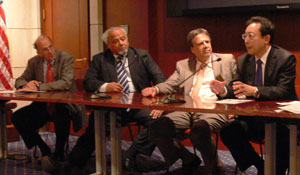Chronic disease battle needs global collaboration
July / August 2013 | Volume 12, Issue 4

Photo by Cathy Kristiansen
Fogarty Director Dr. Roger I. Glass, US Global AIDS
Coordinator Ambassador Eric Goosby and other
health experts attend a Global Alliance for Chronic
Diseases meeting on Capitol Hill in Washington, DC.
The prevalence of chronic, noncommunicable diseases (NCDs) is rising so rapidly that it threatens to strain health care systems everywhere unless policymakers collaborate to invest strategically in global solutions, according to a panel of global health research representatives speaking recently at the U.S. Capitol.
The pieces are in place for a scale-up of research in NCDs and more rapid implementation of discoveries in the developing world, speakers said at the meeting, organized by NIH and the Global Alliance for Chronic Diseases. The Alliance, an international public-private partnership, facilitates research collaborations striving to treat or prevent NCDs.
Ambassador Eric Goosby, U.S. Global AIDS Coordinator and Office of Global Health Diplomacy director, noted the infrastructure built in developing countries to combat the HIV/AIDS epidemic, malaria and tuberculosis is helping health systems handle NCDs in many ways. With the President's Emergency Plan for AIDS Relief (PEPFAR) funding, health systems have opened hundreds more clinics and many modern laboratories. And the related Medical Education Partnership Initiative is transforming medical education in Africa, to improve the quality and quantity of health care workers.
"I am hoping the international dialogue respects those lessons, but aggressively builds on those platforms," Goosby said. "I think we have the makings for really taking a quantum step to delivering more services to the larger population, helping prevent a lot of NCDs."
Global health was once seen as unidirectional with developed countries supporting the less fortunate, and focused almost entirely on infectious diseases, according to Canadian Institute of Health Research president, Dr. Alain Beaudet. But disease burdens are evolving, as are migration and climate patterns. "We have global health issues within our own country," he said. "Everyone needs to work toward common solutions."
Fogarty Director Dr. Roger I. Glass, who moderated the session, concluded that investing collaboratively in global health research, especially on NCDs, to solve the looming burden on the world's health horizon "is not a luxury but an absolute necessity."
Fogarty, the National Heart, Lung and Blood Institute (NHLBI), National Cancer Institute (NCI) and National Institute of Mental Health (NIMH) are members of the Alliance.
More Information
To view Adobe PDF files,
download current, free accessible plug-ins from Adobe's website.